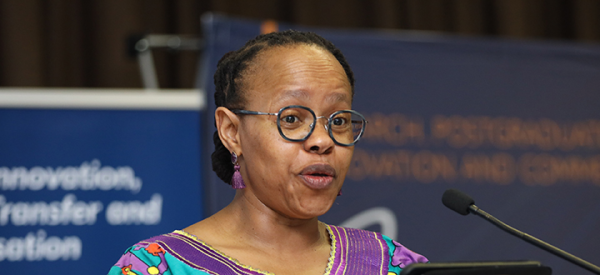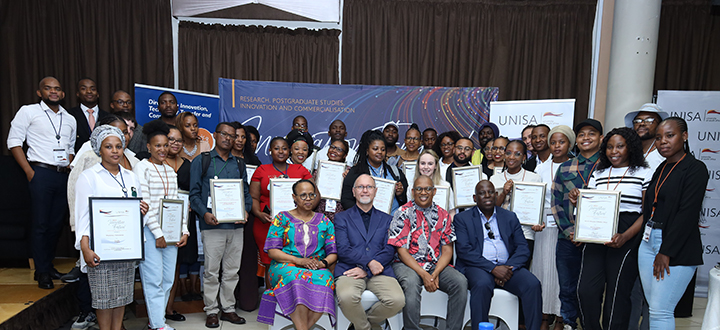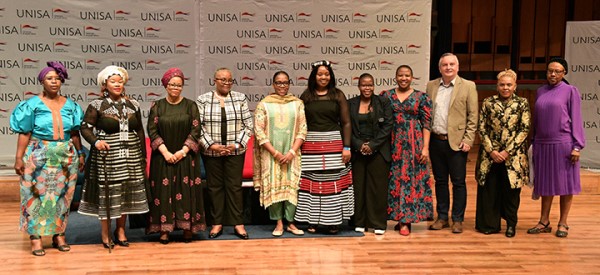
Speaking at the Unisa Innovation Festival 2024 awards ceremony on 29 November, Prof Thenjiwe Meyiwa, Vice-Principal: Research, Postgraduate Studies, Innovation and Commercialisation at Unisa, said that the festival signifies her portfolio's commitment to ensuring that the University’s extraordinary capacity to produce innovation and entrepreneurship is showcased.

Unisa’s Vice-Principal: Research, Postgraduate Studies, Innovation and Commercialisation, Prof Thenjiwe Meyiwa
She continued: "We have individuals whose creativity, tenacity and brilliance indeed push the boundaries of what is possible. As we celebrate the culmination of the Unisa Innovation Festival 2024, it is clear that we are in the presence of leaders."
The festival officially commenced on 25 November 2024, and brought together thought leaders, innovators and entrepreneurs, including students and staff, to explore groundbreaking ideas and celebrate creativity across various industries that makes an impact in the society.
Meyiwa said that as the university that shapes futures in the service of humanity, Unisa must celebrate and reaffirm innovating with impact, and always remember that innovation is not only about technological advancement, but also about reimagining possibilities drawing from lived experiences.
In his opening remarks, Lincoln Mali, Chief Executive Officer of Lesaka Technologies, said the first step towards becoming an innovator is understanding what the problem is that one is trying to solve. Mali shared his experience of turning a previously unprofitable company into one of southern Africa's top financial technology companies. He disclosed that the key to this remarkable turnaround was the strategic use of technology to solve the problems faced by those with limited resources. "The future is having a platform where there is interconnectedness within businesses," Mali explained. "It is not the technology as such that is solving the problem, but the innovative use of that technology."

Lincoln Mali, CEO of Lesaka Technologies
Mali further emphasised that without the proper culture and leadership, innovation cannot flourish. He stressed the importance of having passionate leaders who foster an environment that encourages new ideas and solutions, rather than stifling them. "If innovation is not supported by the leadership team, it won't happen," Mali concluded.
Professors Ntanganedzeni Mapholi, Les Labuschagne and Thenjiwe Meyiwa presented awards that celebrated originality and invention. The awards recognised exceptional accomplishments in a number of categories, including Best Exhibition, Best Poster Presentation, and Best Prototype. Public favourites received the Audience Choice Award, and innovative work was showcased by the Showcase Winners and Crucible Winners. The Unisa Innovation Challenge winners were notable for their ground-breaking concepts. The ceremony served to honour exceptional talent dedicated to reclaiming Africa’s futures. "These winners are proof that South Africa is bursting with innovative talent," said programme director Noxolo Fani, Chief Executive Officer of Phenomenal Light.

2024 Innovation Festival winners , award presenters and guest speakers
Ayanda Noma, Director of Innovation, Technology Transfer and Commercialisation at Unisa, concluded with a message of thanks and celebration. "To all the students, staff members, partners and exhibitors who participated, your ingenuity and commitment to addressing real-world challenges have been nothing sort of inspiring. You are the embodiment of Unisa’s vision to shape futures in the service of humanity. As we conclude this festival, let us carry forward the energy and connections that have emerged throughout the week. Let us never forget that innovation is a journey rather than a destination that requires cooperation, bravery, and the unrelenting pursuit of solutions."
* By Rememberance Manganyi, Intern Journalist, Department of Institutional Advancement
* * Photography by Mduduzi Comfort Khathamzi, Intern, Multimedia Centre
Publish date: 2024/12/04